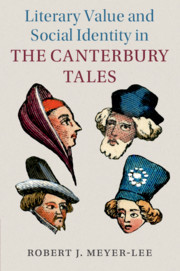Description
Literary Value and Social Identity in the Canterbury Tales
Cambridge Studies in Medieval Literature Series
Author: Meyer-Lee Robert J.
An in-depth reading of the meditation on the relation between literary value and social identity in Chaucer's The Canterbury Tales.
Language: EnglishApproximative price 30.28 €
In Print (Delivery period: 14 days).
Add to cart
Literary Value and Social Identity in the Canterbury Tales
Publication date: 09-2021
Support: Print on demand
Publication date: 09-2021
Support: Print on demand
Literary Value and Social Identity in the Canterbury Tales
Publication date: 10-2019
296 p. · 15.9x23.5 cm · Hardback
Publication date: 10-2019
296 p. · 15.9x23.5 cm · Hardback
Description
/li>Contents
/li>Biography
/li>
Literary authors, especially those with other occupations, must come to grips with the question of why they should write at all, when the world urges them to devote their time and energy to other pursuits. They must reach, at the very least, a provisional conclusion regarding the relation between the uncertain value of their literary efforts and the more immediate values of their non-authorial social identities. Geoffrey Chaucer, with his several middle-strata identities, grappled with this question in a remarkably searching, complex manner. In this book, Robert J. Meyer-Lee examines the multiform, dynamic meditation on the relation between literary value and social identity that Chaucer stitched into the heart of The Canterbury Tales. He traces the unfolding of this meditation through what he shows to be the tightly linked performances of Clerk, Merchant, Franklin and Squire, offering the first full-scale reading of this sequence.
Acknowledgments; Abbreviations; Introduction: The Canterbury Tales IV-V and literary value; 1. Clerk; 2. Merchant; 3. Squire; 4. Franklin; Works cited; Index.
Robert J. Meyer-Lee is Associate Professor of English at Agnes Scott College. He is author of Poets and Power from Chaucer to Wyatt (Cambridge, 2007) as well as numerous articles on Chaucer, fifteenth-century poetry, and literary value published in journals such as Speculum, Studies in the Age of Chaucer, New Literary History, The Chaucer Review, JEGP, and Exemplaria.
© 2024 LAVOISIER S.A.S.





